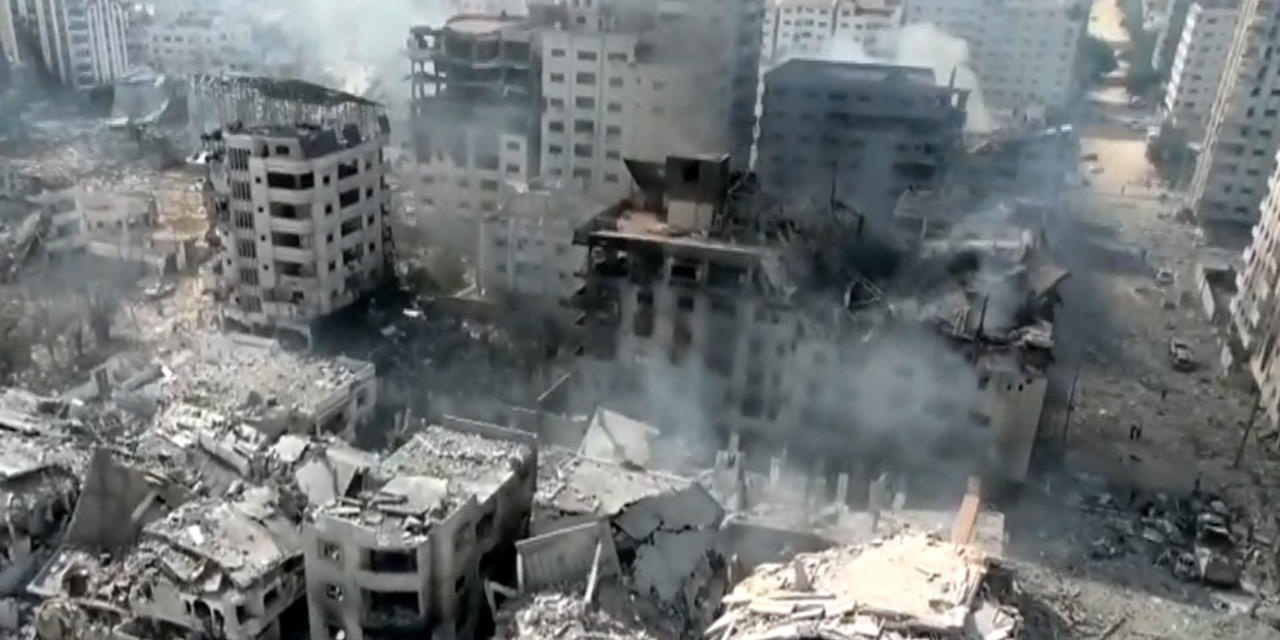Devastation in Gaza after Israeli airstrikes, October 2023 (CBS)
UPDATE, OCT 13:
As the focus shifted from Hamas’s mass killing of civilians in Israel to the Israeli bombing of Gaza, I joined Mary-Ann Okon on Nigeria’s leading radio station Info FM for 40 minutes of discussion.
I discuss the history and current state of Palestine and Israel to give full context for this week’s developments — and to look ahead at what might happen as Israel threatens a ground assault in its attempt to end Hamas’s control of Gaza.
UPDATE 2027 GMT:
I joined Al Jazeera English to evaluate the shifting position of much of the international community towards Hamas in light of its attack on Israel, and how that is reflected in US Secretary of State Antony Blinken’s visit to Israel, the West Bank, and Jordan.
Watch from 3:33:
The position of the US and others is that Hamas and, behind it, Iran must be isolated and their power must be curbed — but we need to discuss carefully how this is to be done because civilians will be killed in large numbers by Israeli retaliation.
UPDATE 1939 GMT:
In a 15-minute deep dive analysis, I spoke with Ireland’s Pat Kenny Show about the latest developments over both Hamas’s attacks and the Israeli bombing and siege of Gaza.
Unable to deliver a decent existence for Gazans on a day-to-day basis, in part because of the Israeli blockade, Hamas puts the population into a state of perpetual war and says, “We’re your only protectors.”
Thus the conundrum for Israel: if you go after the Hamas leadership, who will be hunkered down, you will kill more civilians and drive the others into the arms of the organization rather than distancing residents from it.
UPDATE, OCT 12:
I also spoke with India’s WION News on Wednesday about “war crimes”: both Hamas’s mass killing of Israeli civilians and Israel’s bombing of the densely-populated Gaza Strip.
Israel was going to retaliate against any Hamas attack. We knew that would happen. Hamas knew that would happen.
But Israel’s retaliation will be even more intense because of the nature of Hamas’s assault on civilians. It will commit war crimes in response to Hamas’s war crimes.
ORIGINAL ENTRY, OCT 11: I joined the BBC on Wednesday to analyze the transition from Phase 1 of the Israel-Gaza violence — Hamas’s mass killing of Israel’s civilians — to the Phase 2 of intensive Israeli bombing and siege that will take the lives of Gazan residents.
Listen to BBC West Midlands from 2:09.21
I explain the origins of the conflict, why Hamas’s ground assault distinguishes this particular cycle of confrontation, and how Israel is retaliating against a Gazan population which is trapped and unable to evacuate.
Is there a possibility of “de-escalation” and thus a sparing of life? I answer with caution and more than a bit of regret.
Even if you get to a cease-fire — and goodness knows we need it soon — this conflict does not stop until Hamas is removed from leadership in Gaza and Prime Minister Netanyahu is pushed out.
See also EA on International Media: Hamas Attacks Israel — and What Happens Next
Listen to BBC Radio Scotland from 2:50.06
I discuss the nature of support for Israel from the US, most European countries, and much of the international community despite the casualties in Gaza from the Israeli response.
The belief is that Israel needs support because of the nature of Hamas’s attacks. With all the violence we have seen for decades, this crossed a line.
I think the message will be support against Hamas, not just for security right now but for a path to remove Hamas from the leadership of Gaza.
That said, the other side of the message will be an aversion to Israel continuing the airstrikes that kill so many civilians and to any Israeli ground assault.


Israel may be on verge of ‘mass ethnic cleansing’ of Palestinians in Gaza, UN expert warns: https://www.independent.co.uk/news/world/middle-east/israel-gaza-palestinians-un-invasion-b2429855.html
““Again, in the name of self-defence, Israel is seeking to justify what would amount to ethnic cleansing.”
https://responsiblestatecraft.org/egypt-gaza-israel/
“Cairo worries that, instead of saving lives, a ‘humanitarian corridor’ could be a pretense to permanently exile Palestinians….some calls have appeared to push the Palestinians out of their land and put them into the Sinai to create an alternative homeland,” he said, referring to Egypt’s Sinai Peninsula. “This cannot happen, ever.””
“The position of the US and others is that Hamas and, behind it, Iran must be isolated and their power must be curbed — but we need to discuss carefully how this is to be done because civilians will be killed in large numbers by Israeli retaliation.”
**********
Sending carrier battlegroups into the area might make things worse, sparking a regional war. Diplomacy is needed, and that is what Vladimir Putin called for at a CIS meeting. He appears to be the adult in the room. Maybe the US should talk to Iran instead of isolating and provoking it.